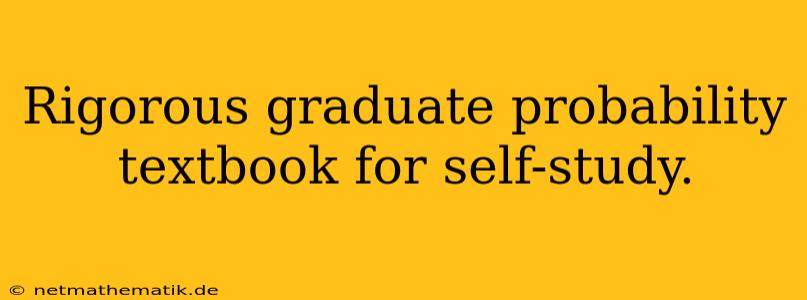Finding the right textbook for self-study in graduate probability can be daunting. The subject is vast and complex, requiring a rigorous approach to truly grasp the underlying concepts. A well-written textbook can be a powerful tool, guiding you through intricate proofs and providing insightful examples that illuminate the theory. This article aims to guide you through the process of selecting a rigorous graduate probability textbook suitable for self-study, highlighting key considerations and offering recommendations for different learning styles.
Choosing the Right Level of Rigor
The first crucial decision is determining the level of mathematical rigor you are comfortable with. Graduate probability courses often cater to students with a strong foundation in calculus, linear algebra, and real analysis. However, the depth and complexity of the material can vary significantly between textbooks.
Here are some factors to consider:
- Prior exposure to probability: If you have taken a basic probability course or have a strong background in statistics, you may be comfortable with a more advanced textbook that delves into measure theory and stochastic processes.
- Desired level of detail: Some textbooks offer concise explanations and focus on key results, while others provide comprehensive proofs and elaborate on the nuances of different concepts.
- Personal learning style: Do you prefer a more theoretical approach with detailed proofs, or do you learn better through concrete examples and applications?
Key Considerations for Self-Study
A good textbook for self-study should:
- Provide clear and concise explanations: It should effectively convey complex ideas in a way that is easy to understand and follow.
- Offer numerous examples and exercises: This is crucial for solidifying your understanding and building problem-solving skills.
- Include solutions or hints for exercises: This is especially important for self-study, as you can check your work and identify areas where you need further practice.
- Have a well-structured organization: The material should be presented in a logical order, building gradually from foundational concepts to more advanced topics.
Recommended Rigorous Graduate Probability Textbooks
Here are some highly-regarded rigorous graduate probability textbooks known for their suitability for self-study:
Classic Texts
- Probability: Theory and Examples by Richard Durrett: This book is a standard choice for graduate probability courses and is widely praised for its clarity and comprehensive coverage. It offers a rigorous treatment of the subject, starting with basic concepts and gradually progressing to more advanced topics such as Markov chains, martingales, and stochastic processes.
- Probability and Measure by Patrick Billingsley: This classic text provides a more abstract and measure-theoretic approach to probability, focusing on the mathematical foundations of the subject. While demanding, it offers a deep understanding of the theory and is a valuable resource for those interested in advanced probability theory.
Modern Texts
- A First Course in Stochastic Processes by Samuel Karlin and Howard Taylor: This textbook focuses on stochastic processes, providing a rigorous introduction to the topic and covering key examples such as Markov chains, Brownian motion, and queueing theory. It is well-suited for students with a strong foundation in probability and calculus.
- Probability and Random Processes by Geoffrey Grimmett and David Stirzaker: This book offers a comprehensive treatment of probability and random processes, covering a wide range of topics from basic concepts to advanced topics such as martingales and point processes. It is well-organized and provides clear explanations and examples.
Choosing the Right Textbook for You
The best rigorous graduate probability textbook for self-study depends on your individual needs and preferences. Consider the level of rigor you are comfortable with, your prior knowledge of probability, and your preferred learning style. It is also helpful to read reviews and browse online resources to get a sense of the content and style of different textbooks.
Ultimately, the key to success in self-study is choosing a textbook that you find engaging and motivating. A rigorous graduate probability textbook can be a valuable companion on your journey to mastering this fascinating and essential subject.
